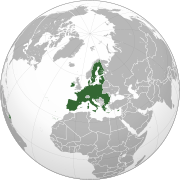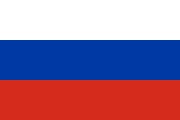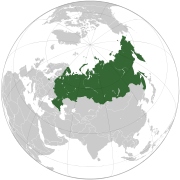Potential superpower
This article or section possibly contains synthesis of material which does not verifiably mention or relate to the main topic. (November 2008) |

A number of states have been speculated to be in the process of turning into superpowers at some point of the ongoing 21st century. Among the most commonly mentioned are China[3] [4], the European Union[5], India[6] and Russia[7][8]. However, the record of such predictions has not been perfect. For example, in the 1980s, political and economic analysts erroneously predicted that Japan would eventually accede to superpower status, due to its large population, huge GDP, and high economic growth at that time.[9]The most common belief held is that only the United States currently fulfills the criteria to be considered a superpower.
China
| People's Republic of China | |||
|---|---|---|---|
 | |||
 |
The People's Republic of China receives continual coverage in the popular press of its potential superpower status,[10][11] and has been identified as a rising or emerging economic and military superpower by academics and other experts.[12][13][14][15] Shujie Yao of Nottingham University has said that, "China will overtake the United States to become the world's largest economy by 2038 if current growth rates continue," and that China's GDP will overtake that of Japan by 2017 or 2018, and Germany's by 2008. Yao believes that "under an optimistic scenario, China could become a real superpower in 30 years' time."[16]
International relations analyst Parag Khanna states that by cutting massive trade and investment deals with Latin America and Africa, China has established its presence as a superpower along with the European Union and the United States. China's rise is demonstrated by its ballooning share of trade in its gross domestic product. He believes that China's consultative style has allowed it to develop political and economic ties with many countries including those viewed as rogue states by the United States. He states that the Shanghai Cooperation Organization founded with Russia and the Central Asian countries may eventually be the "NATO of the East".[17]
Geoffrey Murphay's China: The Next Superpower argues that while the potential for China is high, this is fairly perceived only by looking at the risks and obstacles China faces in managing its population and resources. The political situation in China may become too fragile to survive into superpower status according to Susan Shirk in China: Fragile Superpower.[18] Other factors that could constrain China's ability to become a superpower in the future include: limited supplies of energy and raw materials, questions over its innovation capability, inequality and corruption, and risks to social stability and the environment.[19]
European Union
| European Union | |||
|---|---|---|---|
 | |||
 |
The European Union (EU) has been called an emerging superpower by academics.[5][20] T.R. Reid,[21] Andrew Reding,[22] Mark Leonard[23] and John McCormick (2007),[24] believe that the power of the EU will rival that of the United States in the 21st century. Leonard cites several factors: the EU's large population, large economy (EU has the world's largest economy, EU nominal GDP is 22% higher than that of the U.S.), low inflation rates, the unpopularity and perceived failure of US foreign policy in recent years, and certain EU members states' high quality of life (when measured in terms such as hours worked per week).[25]
John McCormick believes that the EU has already achieved superpower status, based on the size and global reach of its economy and on its global political influence. He argues that the nature of power has changed since the cold war-driven definition of superpower was developed, and that military power is no longer essential to great power; he argues that control of the means of production is more important than control of the means of destruction, and contrasts the threatening hard power of the United States with the opportunities offered by the soft power wielded by the European Union.[26]
Parag Khanna agrees, and like McCormick and Leonard believes that the EU will rival the power of the United States in the 21st century.[27][28] He also mentions the large economy of the EU, that European technologies more and more set the global standards and that European countries give the most development assistance. On the fact that the EU lacks a common army, he agrees with McCormick that the EU does not need one. The EU uses intelligence and the police to apprehend radical Islamists, social policy to try to integrate restive Muslim populations and economic strength to incorporate the former Soviet Union and gradually subdue Russia.[27] Khanna also writes that South America, east Asia, and other regions prefer to emulate the "European Dream" than the American variant.[29] This could possibly be seen in the South American Union and the African Union.
Additionally, it is argued by commentators that full political integration is not required for the European Union to wield international influence: that its apparent weaknesses constitute its real strengths (as of its low profile diplomacy and the obsession with the rule of law)[30][31] and that the EU represents a new and potentially more successful type of international actor than traditional ones;[32] however, it is uncertain if the effectiveness of such an influence would be equal to that of a politically integrated superpower such as the United States.[citation needed]
On the other hand, Laurent Cohen-Tanugi[33] states that the EU as a whole has consistently suffered from a growth deficit compared to the US, high unemployment, and public deficits even while most member states of the EU lagged substantially behind the US in R&D investment, technological innovation, and, since 1995, productivity gains. In addition, the National Intelligence Council predicts that the EU could become a "hobbled giant", unable to translate its economic clout into global influence due to demographic deficits, competing national agendas, and integration difficulties. [34].
India
| Republic of India | |||
|---|---|---|---|
 | |||
 |
Newsweek and the International Herald Tribune join several academics in discussing India's potential of becoming a superpower.[6][35][36] Narendra Jadhav, a principal advisor to the Reserve Bank of India and a former advisor to the executive director at the IMF, says "India is well on its way to become an economic super power" due to its "large and growing population of young people".[37]
Founder and President of the Economic Strategy Institute and former counselor to the Secretary of Commerce in the Reagan Administration Clyde V. Prestowitz Jr. has predicted that "It is going to be India's century. India is going to be the biggest economy in the world. It is going to be the biggest superpower of the 21st century."[38]
Minister Mentor and former Prime Minister of Singapore Lee Kuan Yew assesses India's potential as an "international power" by predicting that:
India’s economy can grow to about 60-70 percent that of China. I see that as the long-term trend. They’re not going to be bigger than China - on present projections. But 60-70 percent of China with a population which will be bigger than China by 2050, is something considerable, and they’ve some very able people at the top. I draw this historical lesson which I believe will be repeated, though not in exactly the same way, but will manifest itself in a similar pattern.[39]
Parag Khanna believes that India is not, and will not become a superpower for the foreseeable future, lagging decades behind China in both development and strategic appetite.[40] Instead, he believes India will be a key swing state along with Russia.[41] He says that India is "big but not important," has a highly successful professional class, while millions of its citizens still live in poverty. It is "almost completely third world".[42] He also writes that it matters that China borders a dozen more countries than India does, is not hemmed in by a vast ocean and the world's tallest mountains, has a loyal diaspora twice the size of India's and enjoys a head start in Asian and African marketplaces.[43]
China and India rising to superpower status is not inevitable, according to Pranab Bardhan, Chief Editor of the Journal of Development Economics, who suggests that millions mired in poverty and ineffective government prevents China or India from rivaling the EU or the US any time soon.[44]
Russia
| Russian Federation | |||
|---|---|---|---|
 | |||
 |
The Russian Federation has been suggested by some [45] as a potential candidate for resuming superpower status in the twenty-first century due to its fast-growing economy, energy superpower status and the size of its military.[46] According to Steven Rosefielde of the University of North Carolina, Chapel Hill, Russia intends to "reemerge as a full-fledged superpower," and "contrary to conventional wisdom, this goal is easily within the Kremlin’s grasp, but the cost to the Russian people and global security would be immense" [47]. Rosefielde further argues that "Russia has an intact military-industrial complex... and the mineral wealth to reactivate its dormant structurally militarized potential," and that "supply-side constraints don’t preclude a return to prodigal superpowerdom"[48].
Alexander Golts of the St. Petersburg Times argues that Putin's confrontations with the US on nuclear issues are in pursuit of regaining superpower status for Russia.[49] In a more recent report by ABC News, a senior U.S. official asserted that "Russia is once again indisputably the number two military power in the world, second only to the United States".[50] Mike Ritchie of industry analysts Energy Intelligence says "Russia was always a superpower that used its energy to win friends and influence among its former Soviet satellites. Nothing has really changed much. They are back in the same game, winning friends and influencing people and using their power to do so."[51] Russia is often considered to be an energy superpower and a nuclear superpower due to its vast amounts of natural resources and large nuclear arsenal mostly leftover from the former Soviet Union.[52][53][54]
There are significant obstacles to Russia gaining superpower status. In recent years Russia's sphere of influence significantly shrunk owing in part to gains by the EU and NATO.[55][56] Russia's currently shrinking and aging population[57][58][58][59][60] is a major problem for the country. In addition, Russia is currently only the eleventh largest economy in the world by nominal GDP, and by this parameter is approximately thirteen times smaller than the EU economy and about eleven times smaller than the US one (in 2007). However by GPD (PPP), Russia had the 7th largest economy in 2007. Russia is heavily reliant on resource extraction, especially fossil fuels, for its economy.[61]
See also
References
- ^ Country profile: United States of America, BBC News, Accessed July 22, 2008
- ^ "Analyzing American Power in the Post-Cold War Era". Retrieved 2007-02-28.
- ^ Lague, D (2007) China builds a superpower fighter, International Herald Tribune
- ^ http://www.guardian.co.uk/commentisfree/2006/jun/15/comment.china
- ^ a b Guttman, R.J. (2001) Europe in the New Century, Lynne Rienner Publishers
- ^ a b India Rising | Newsweek International | Newsweek.com
- ^ Hill, F (2002) Russia: The 21st Century's Energy Superpower?, Brookings Institution
- ^ Rosefielde, S (2004) Russia in the 21st Century, Cambridge University Press
- ^ Greenwald, J (1988) Japan From Superrich To Superpower, TIME
- ^ Visions of China, CNN Specials, Accessed March 11, 2007
- ^ China builds a superpower fighter, IHT, Accessed March 11, 2007
- ^ US-China Institute :: news & features :: china as a global power
- ^ www.carnegieendowment.org
- ^ www.getabstract.com
- ^ www.au.af.mil
- ^ China to become world’s largest economy by 2038, Nottingham professor says, School of Contemporary Chinese Studies, University of Nottingham
- ^ Waving Goodbye to Hegemony (PARAG KHANNA)
- ^ China: Fragile Superpower, Description, Oxford University Press, Accessed March 11, 2007
- ^ www.nottingham.ac.uk
- ^ Wilson Center The EU Future: Global Power or European Governance?, Wilson Center
- ^ Reid, T.R. (2004) The United States of Europe 305p, Penguin Books ISBN 1594200335
- ^ Reding, A (2002) EU in position to be world’s next superpower, Chicago Tribune
- ^ Mark Leonard (2006) Why Europe Will Run the 21st Century, Perseus Books Group ISBN 1586484249
- ^ John McCormickThe European Superpower
- ^ Mark Leonard (2005) Europe: the new superpower, Irish Times
- ^ John McCormickThe European Superpower
- ^ a b Khanna P.Waving Goodbye to Hegemony, New York Times Magazine
- ^ Khanna P.Guess Who's Coming to Power
- ^ Khanna P.[1]
- ^ John McCormickThe European Superpower
- ^ MArk Leonard (2005) The Project for a New European Century, The Globalist
- ^ Hyde-Price A (2004) The EU, Power and Coercion: From 'Civilian' to 'Civilising' Power Arena
- ^ Laurent Cohen-Tanugi, "The End of Europe" in Foreign Affairs, 84, (2005), 6, 55-67.
- ^ National Intelligence Council, "Global Trends 2025: A Transformed World" in [2], 52-53, (2008).
- ^ India welcomed as new sort of superpower, IHT, Accessed March 11, 2007
- ^ India: Emerging as Eastern or Western Power?, YaleGlobal, Accessed March 11, 2007
- ^ Advantage India: Growing young population
- ^ [3], Rediff India, Published March 29, 2006
- ^ [4], International Herald Tribune, Published August 29, 2007
- ^ Waving Goodbye to Hegemony
- ^ Khanna, P (2008) The Second World: Empires and Influence in the New Global Order, “Random House” ISBN 978140065080
- ^ We’re #1? Tell China
- ^ The Rise of Non-Americanism
- ^ India Superpower? Not so Fast!, YaleGlobal, Accessed March 11, 2007
- ^ http://www.russiaprofile.org/page.php?pageid=CDI+Russia+Profile+List&articleid=2015
- ^ http://www.russiaprofile.org/page.php?pageid=CDI+Russia+Profile+List&articleid=2015
- ^ Rosefielde 2005:1
- ^ Rosefielde 2005:9
- ^ St. Petersburg Times: "Dreaming of New Conflicts"
- ^ Rice: Russia's Military Moves 'a Problem' ABC News Oct. 14, 2007
- ^ Russia: A superpower rises again[December 13, 2006]
- ^ Goldman, Marshall I. (October 11, 2006). "Behold the new energy superpower". International Herald Tribune. Retrieved 2007-10-08.
- ^ Chance, Matthew (Junde 27, 2007). "Eye on Russia: Russia's resurgence". Cable News Network. Retrieved 2007-10-08.
{{cite web}}: Check date values in:|date=(help) - ^ "Russia: A superpower rises again". Retrieved 2006-06-10.
- ^ [5]
- ^ [6]
- ^ BBC NEWS | World | Europe | Russia faces demographic disaster
- ^ a b Russia, Population, Demographic Crisis - JRL 4-28-05
- ^ Russia is falling apart. It is slowly populated by Chinese, political expert Zherebetsky warns
- ^ [7]
- ^ Russia Called Too Reliant on Petroleum - New York Times
